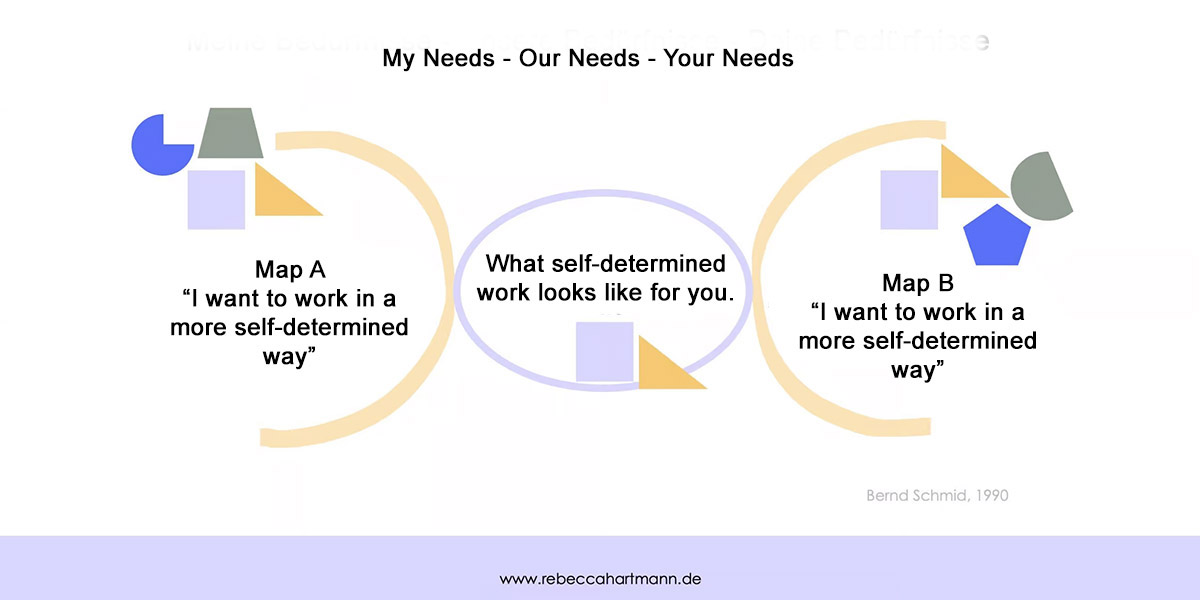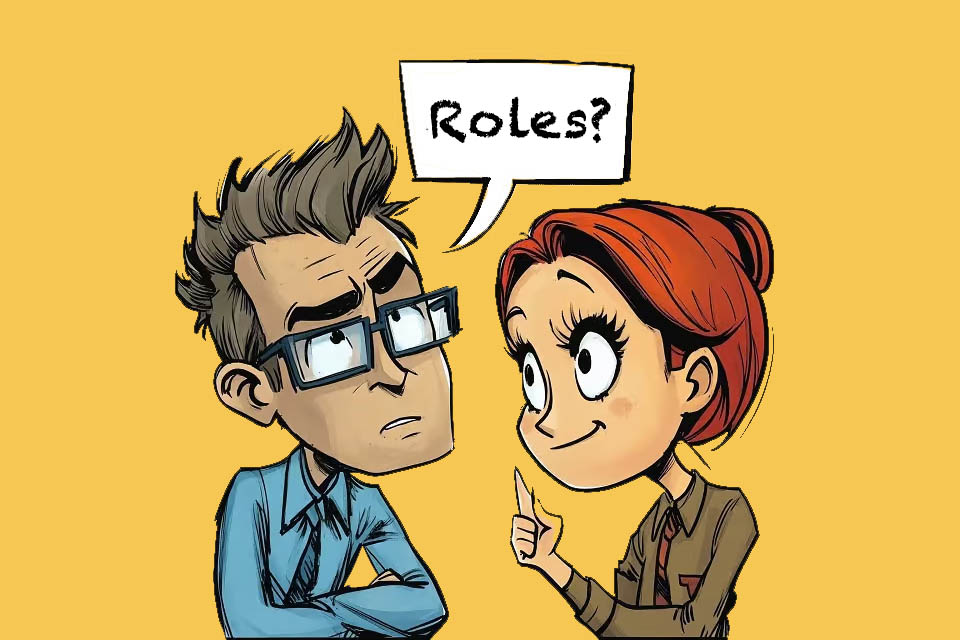Do you talk about needs in the team?
The discussion about the new generation and their needs is not abating. Often condemned, frequently misunderstood, in many cases misinterpreted. The majority of companies focus on Gen Z when it comes to the topic of needs. They try to win them over by all possible means, forgetting about the other generations.
Likewise, many are frantically trying to bring more “New Work” into their company, at least superficially. If you ask why, the answers are usually the same: Shortage of skilled workers, dissatisfaction, conflicts between the generations.
The whole thing culminates in employer branding and the list of benefits becomes so long that no one manages to finish it. But once the employees are there, this sticking plaster fails and there is nothing in it for the existing employees anyway.
Needs in the world of work
Dissatisfaction, employee turnover, stress and conflicts are mostly based on the fact that our needs are not met.
So what is it all about?
The goal is to create a working environment that supports employees in working well and achieving good results and success for the company. New Work and also New Teamwork is not an end in itself, but serves to design sustainable workplaces in order to be successful as a company. And this success depends on the people and teams in the company.
Why don’t we talk about the deeper needs instead of benefits? Because then we would be doing something in the long term for employee retention, satisfaction, cooperation and thus also for the company and all the generations that are there.
Therefore, the questions are:
- What do you require to work well?
- What really makes people stay with a company and contribute all their knowledge and skills?
- How do you create a working environment that intrinsically motivates employees, far from benefits and fancy office space?
- How does a really good and efficient team come into being?
It is not new that our needs have a great influence, but it is new that this topic is being heard. What might have been told by a few business psychologists and possibly a few coaches in the past is finally finding acceptance in companies and its place in the world of work.
Because our intrinsic needs are the same, regardless of generations and the number of benefits.
Intrinsic needs are our very own drive, they control our behaviour and form the foundation of interpersonal relationships. They also have a direct influence on the performance and well-being of employees. A distinction is made between individual and collective needs.
Individual needs are what drive each person’s motivation, actions and decisions.
Collective needs concern cooperation and have a direct influence on the success of a team and thus the company. Examples are open communication, clear objectives, trust and a sense of belonging.
Individual needs can vary from person to person, and collective needs can also vary in teams. Therefore, it is necessary to create spaces to talk about differences and commonalities.
The basic needs in every team
There are three basic psychological needs that exist in every generation and in every team: Autonomy, connectedness and experience of competence.
Autonomy in the work context refers to self-determination. It is about making one’s own decisions and being able to act independently of others. In other words, having control over one’s own work area.
Connectedness refers to closeness. Inclusiveness in the team, relationships within the team, support and trust.
The experience of competence refers to effectiveness. It is about the feeling of being able to contribute one’s own skills, to complete tasks successfully, to finish and to develop oneself.
These three basic needs stem from the self-determination theory of Edward Deci and Richard Ryan. It states that people are inherently engaged and focused on development. They strive to integrate themselves into social structures. It also states that autonomy, relatedness and the experience of competence are responsible for motivation, well-being and satisfaction at work. They significantly determine our behaviour. If these aspects are not present, negative consequences such as listlessness, exhaustion or irritability can occur and thus influence morale and productivity.
Needs orientation in the team
Leaders and companies that respond to this and take time for a serious exchange can create a working environment that is truly motivating and contributes to the development of potential and well-being. Needs are of central importance when it comes to the dynamics of cooperation.
When team members know each other’s individual expectations and desires, a working environment is created in which employees feel seen, appreciated and also motivated. Needs have a significant impact on the success of teamwork. If they are neglected, this leads to conflicts, stress, mistrust, lack of drive and pessimism. Which shows in the behaviour of the employees and can really only be solved at the level of needs.
In short, talking about needs together creates deeper connections, trust, good relationships and ultimately good work results.
Hacks for the practice – needs orientation in cooperation
So if you want to start developing your team into a successful, motivated and satisfied team, start talking about needs.
Of course, there are other intrinsic aspects besides autonomy, connectedness and the experience of competence, such as fulfilment of meaning or recognition.
You could ask your team members, for example:
- What are your wishes and what influence do they have on the cooperation?
- What are the expectations of your team colleagues?
- How can we communicate our concerns?
- How can we fulfil each other’s expectations?
Use Jurgen Appelo’s Moving Motivators to make the different needs in the team visible, get to know each other better and thus create a basis for a meaningful exchange.
First of all, let the employees quietly reflect on what expectations and attitudes they have. Put them in order of importance, from very important to less important, and then discuss what happens when one of the three most important needs is violated.
It is not uncommon for me to hear after such an exercise something like “Oh, now I realise why we keep clashing on some issues”.
See how you can reconcile the different expectations and desires that exist. Work with a needs marketplace that shows what your needs are, what the staff have and what they have in common.
Notes:
When it comes to feedback, especially critical feedback, it helps to know and formulate needs. Rosenberg’s Nonviolent Communication is a helpful framework for communicating appropriately.
Are you interested in New Teamwork and the development of a culture of trust and a sense of “we”? Do you want to clarify responsibilities, expectations and wishes with external help? Then it’s worth taking a look at Rebecca Hartmann’s great website. Feel free to get in touch if you are interested in team workshops, individual coaching, training or impulse lectures.
Sources (in German):
Motivation und Emotion by V. Brandstaetter, J. Schueler, R. M. Puca and L. Lozo
Theorie U by Otto Scharmer
Bedürfnispyramide by Abraham Maslow
Selbstbestimmungstheorie by Edward Deci and Richard Ryan
Moving Motivators by Jurgen Appelo
Gewaltfreie Kommunikation by M. B. Rosenberg
Kulturbegegnungsmodell der Kommunikation by Bernd Schmid
This is a best of blog post 2023.
If you like the article or want to discuss it, feel free to share it with your network.
Rebecca Hartmann has published two more articles in the t2informatik Blog:

Rebecca Hartmann
Rebecca Hartmann is a business psychologist, systemic team developer and coach. She believes that good cooperation does not just happen, but is consciously shaped. She supports managers and teams in enabling truly effective cooperation: with psychological security as a foundation, clear roles as a structure and formats that really work in everyday life. In doing so, she draws on her many years of organisational experience and combines her psychological knowledge with her systemic expertise.
In the t2informatik Blog, we publish articles for people in organisations. For these people, we develop and modernise software. Pragmatic. ✔️ Personal. ✔️ Professional. ✔️ Click here to find out more.



